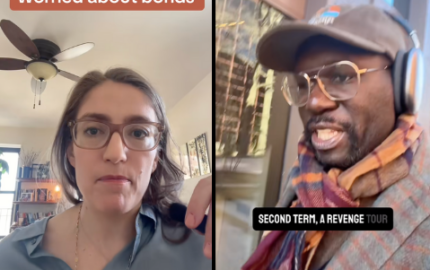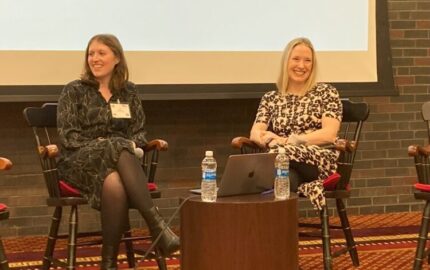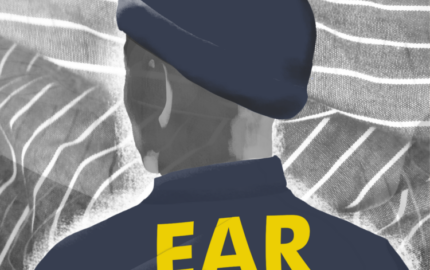The title of this series, “Audio danger,” is mostly tongue-in-cheek. But not in the case of Kelly McEvers. McEvers now works as one of NPR’s correspondents in the Middle East, and she’s opened the network’s first bureau in Beirut. But I first ran across her name in 2006, when she was a freelance journalist in Russia on an International Reporting Project fellowship. McEvers had been detained in Dagestan, a rough part of the North Caucasus along the Caspian Sea. Local officials with the FSB, the federal security services, accused her of traveling in neighboring Chechnya.
“They interrogated me for like 14 hours a day, and then at night they’d say, ‘You’re free to go,’ but they had my passport. And then they would follow me home. The car would stay parked out front for a few hours, and then they would call the next morning and say, ‘It’s time to go.’ ”
McEvers didn’t suffer any violence during the four-day ordeal, but the threat of it was very real. (She also had to surrender all of her notes and equipment before she was allowed to leave Dagestan).
 These days, McEvers interviews many people who’ve been through horrible experiences: child brides who’ve survived rape in Yemen; protesters tortured in Syria. McEvers lets their stories unfold with an understanding of the way real danger – unlike the kind we often see in the movies – has deep effects that can make it hard to talk about.
These days, McEvers interviews many people who’ve been through horrible experiences: child brides who’ve survived rape in Yemen; protesters tortured in Syria. McEvers lets their stories unfold with an understanding of the way real danger – unlike the kind we often see in the movies – has deep effects that can make it hard to talk about.“I can see when someone has experienced trauma,” McEvers says. “I think I’m able to empathize a lot more with people because I have been through some of this stuff. Nothing like what they’ve been through – I mean, people aren’t cutting my relatives into pieces. But I know what it’s like to just be numb, or to blame yourself.”
McEvers’ patience paid off last year with this feature she pursued for months in Iraq. It introduces us to Uhud, a 19-year-old woman from a tribal area of Diyala, northeast of Baghdad. Uhud fell prey to a sex-trafficking scam, the details of which we will never figure out. That confusion, in fact, is central to the story.
“Some of what we’re about to tell you might not actually be true,” McEvers says at the very top of the piece. “The reasons for this will become clear as the story unfolds.”
According to Uhud’s convoluted account, she was kidnapped at gunpoint while out shopping, then beaten and later taken to Irbil, in Kurdistan. There she says she worked in a Christian-owned café somehow affiliated with a brothel. A famous soccer player later rescued her, Uhud says, and a few months later she ended up back home in Diyala.
“When she first came, the whole family had one thing in mind: We assumed she had been raped. So we thought of killing her,” one male relative tells McEvers in a matter-of-fact way, via an interpreter. “She has a brother who would kill her as easily as drinking a glass of water. But then we calmed things down.”
Sort of. When we revisit Uhud a few months later, she’s basically living under family house arrest. She says an uncle spits on her whenever he sees her and threatens to slit her throat if her story doesn’t check out. As McEvers leaves Uhud, she’s up on the roof setting pet pigeons free. “They fly in the sky for a while, then they come back home,” McEvers translates for Uhud over the sound of flapping wings.
We’ll never know Uhud’s real story, but of course that’s not the point: By living with her for seven minutes, we viscerally feel the way shame and sex-trafficking thrive off one another.
Foreign correspondents for radio face special hurdles. The people they interview often don’t speak English, so we lose the direct narrative force that propels so many audio stories. And most of us have never been to places like war-torn Iraq, so even with great descriptive copy, our minds still tend to fill in the background with stereotypical images from TV news or “National Geographic”: deserts, burqas, bullet-pocked walls.
Of course, correspondents can’t only focus on personal narratives, and McEvers does her share of big-picture, geopolitical reporting. But stories like Uhud’s are one way to slice through the obstacle of listener confusion (and, let’s face it, indifference) when it comes to reports from abroad.
“I try to make those personal stories have a larger point, but just to reach that point through personal narratives. People in Dubuque are going to remember that more than a talking head,” McEvers says.
And radio has one major advantage when it comes to McEvers’ frequent focus on the plight of women in the Middle East.
“A microphone is so much easier than a camera,” she says. “You never get to take pictures of these women. Never. Especially those women with a shameful story.” McEvers sometimes spends a lot of time explaining to her sources how they will sound on the other end in America. “You know, ‘It’s just your voice – it’s going to be dubbed into English.’ I draw pictures of what it’s going to sound like, (their voices) fading under (the translation).” Sometimes reluctant sources will agree to whisper, or speak broken English, to hide their identities further.
But especially as the Arab world changes so rapidly, McEvers says she can face a different problem – people so desperate for someone to hear their stories, they won’t let her leave. “In Iraq, there are so many widows, or mothers who’ve lost children. No one’s listening to them.”
These days McEvers’ own personal narrative is affecting the way she thinks about trauma and danger in her profession. She now has a 2-year-old daughter. Questions about her ordeal seven years ago in Dagestan elicit a snort.
“It should’ve been instructive, but it’s not. I didn’t learn my lesson,” she says. “But none of us do.” It’s something few foreign correspondents talk about openly, McEvers says: Simply put, editors – and by proxy, the rest of us – too often reward them for putting their lives at risk in pursuit of the story.
“When you have little children, you think a lot about positive and negative reinforcement,” she says. “And we foreign correspondents are positively reinforced for bad behavior.”
Julia Barton (@bartona104) is an editor, media trainer, producer and writer who spearheads the “Audio danger” series on Storyboard.


